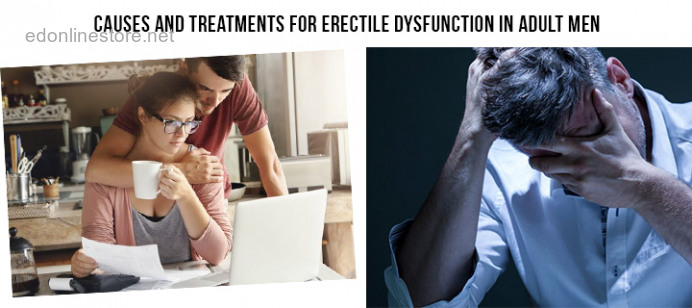Erectile dysfunction (ED), also known as impotence, is a type of sexual dysfunction characterized by the inability during sexual activity to produce or sustain penile erection. ED may have psychological effects as it may be related to problems in relationships and self-image.
In about 80% of cases, a physical cause can be identified
These include cardiovascular disease, diabetes mellitus, neurological issues such as prostatectomy follow-up, hypogonadism, and side effects of drugs. Psychological impotence is where, due to thoughts or feelings, erection or penetration fails; this is somewhat less common; around 10 percent of cases. There is a strong response to placebo therapy in mental impotence. For other erection disorders, such as priapism, the term erectile dysfunction is not used.
Treatment involves treating the underlying causes, changes in lifestyle, and psychosocial problems
A pharmacological treatment trial with a PDE5 antagonist, such as sildenafil, can be used in many cases. In some cases, care can include insertion of prostaglandin pellets into the urethra, injection into the penis of smooth muscle relaxants and vasodilators, a penile prosthesis, a penis pump, or reconstructive vascular surgery. It’s the men’s most common sexual issue.
Erectile dysfunction is very common, and as men age it becomes more common.
An Australian survey showed that there are erectile issues with at least one in five males over 40 years of age and about one in ten men were absolutely unable to have erections. The risk of developing erectile issues rises with each increasing decade of age.
It is a complicated process to get an erection
There are two tubes that run along the length of the penis with spongy tissue. This spongy surface is surrounded by a strong fibrous, partly elastic outer shell. The spongy tissue is arranged in such a way that more blood can be collected in the penis when activated by the nerves. Then compress the veins running through the penis’ outer sheath, which stops the blood from leaving the penis. As blood is stopped from flowing out, the penis fills with blood and stretches into the outer casing, resulting in an erection.
Muscle cells react to chemicals in the body in both the spongy tissue and blood vessels; some cause an erection to occur and some make the penis flaccid (soft). The balance of these chemicals depends on whether the penis is soft or hard.
Several factors can affect the ability of a person to get and maintain an erection, and at one time there may be many factors
- There is usually a mixture of physical and psychological variables.
- There is sometimes no clear reason for erectile dysfunction, but most erectile dysfunction cases have a physical cause.
For most men, it is not possible to cure erectile dysfunction; for some, the underlying cause may be reversible. It is therefore important to evaluate all men with erectile problems to see if there is a cause that can be treated.
There will usually be no specific treatment that will lead to erectile dysfunction improvement
There are treatments, however, that will allow erections to occur and can be used to allow sexual activity to occur.
Phosphodiesterase-5 (PDE5) inhibitors are called erectile dysfunction tablet medicines, which refers to the chemical mechanism of these treatments.
Australia currently has three PDE5 inhibitors: sildenafil (Viagra), tadalafil (Cialis) and vardenafil (Levitra).
PDE5 inhibitors work well and are safe for treating most men with erectile dysfunction, allowing intercourse in about 70 per cent of users.
Extracorporeal shock wave therapy of low intensity has been suggested as a new non-invasive treatment for erectile dysfunction caused by blood vessel problems. Machines for shock wave therapy are now available in some Australian medical practices. While there is some evidence that it can support a proportion of men with erectile dysfunction, further research is needed before it is possible to make concrete recommendations about its use.
Psychosocial factors are significant and can cause erectile dysfunction on its own or in combination with other causes of erectile dysfunction such as diabetes and heart disease. Relationships are complicated and tensions are caused by many factors that can affect sexual relations. These issues may become ongoing for some men, and it may help to talk to a skilled counselor through the issue. Understanding that the longer erectile dysfunction remains untreated, the greater the relationship effect. This is another example as to why it is important to treat early erectile dysfunction.


“I was 16 when I first realized that my penis was not firm while I masturbated.
Then I stopped having morning erections. These were the first signs that something was not going well.
Over the next 12 months, things got progressively worse.
I am a 47 year old heterosexual male have experienced erectile dysfunction for approximately 3 years now. I first dealt with this issue proximately 11 years ago what I contracted acute category 2 prostatitis. At that time I was prescribed finasteride and antibiotics. The condition resolved itself within 90 days at that time. At this point I do not believe prostatitis is to blame even though I do have a very limited number of symptoms that are similar. Speaking with my primary care physician in discussing the situation with a close friend, I believe this is related to low testosterone. My physician is extremely conservative when it comes to hormone therapy and has told me that “since all the equipment still works” he believes that diet and exercise will help to resolve the issue. I have lost some weight and begun a light exercise routine. I have seen some improvement in the erectile dysfunction. However I have to say things are moving very slowly and I am considering seeking a different doctor’s advice in getting tested for testosterone levels. Fortunately my wife and I have been married for nearly 30 years and this is not affected our relationship in an extremely adverse way. However to say that it has not affected us at all would not be truthful.
I have been dealing with this issue for three years. After that I found the perfect combination of medicine and psychological therapy that helped me overcome that situation.
At the beginning, it happened only occasionally, so I did not think about it as something severe. However, after months it started to build up and my wife thought that it is because of her. Only after a year, I was brave enough to admit and seek for help